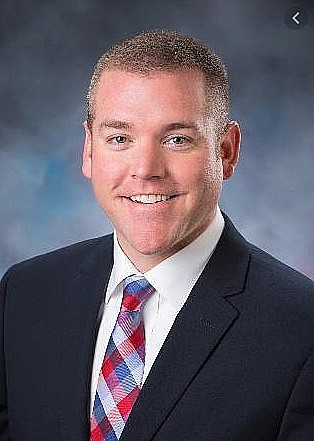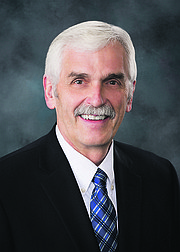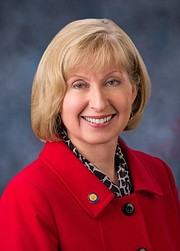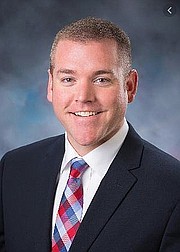Little, lawmakers square off over COVID emergency
Gov. Brad Little said the state Legislature’s attempts to unwind his emergency declaration and subsequent restrictions in the wake of COVID-19 will end up harming Idahoans, something he won’t stand for without a fight.
“I don’t know what he was thinking about when he said that,” Rep. Ron Mendive, R-Coeur d'Alene, said. “There’s nothing I could have done or said that unified the Legislature against him more than his own comments today.”
Little gave a somewhat impromptu speech Friday — as his staff didn’t schedule the comments on his calendar until that morning — in which he went on the offensive, decrying emergency-rescinding legislation currently maneuvering its way through House and Senate chambers as threats to Idahoans that would unwind federal emergency funds and pull resources from the health care system his pandemic team and front line health care workers have been trying to protect since the pandemic began.
“Let me be clear,” Little said. “Undeniably, COVID-19 is an emergency. Hundreds of Idahoans have died, and many more have been horribly sick. Many Idahoans still face that same terrible risk. The COVID-19 emergency declaration was requested by Idaho communities and it is critical in order for Idaho to receive federal assistance — your taxpayer dollars — to manage this crisis."
Little added what should be a celebratory revelation with the introduction of a vaccine to the pandemic landscape has been soiled by the actions of the Idaho House and Senate.
“We are in the final lap of the pandemic fight, and the finish line is close,” he said. “We are so close to returning to normal. But all that success is threatened by the actions taking place in the Legislature right now.”
But Little’s comments criticizing legislators’ claims his emergency declaration’s infringes on Idahoans’ rights as a “myth” sparked backlash among members of both the Idaho House and Senate.
“The COVID-19 emergency declaration has enabled us to quickly cut red tape and increase health care access,” Little said. “These are facts. Here is the myth: the emergency declaration somehow shuts down Idaho or takes away your rights. That is patently false. Amazingly, some in the Idaho Legislature are perpetuating that myth and actively seeking to end Idaho’s COVID-19 emergency declaration.”
One such legislator who took exception was Mendive, who said Little’s comments likely galvanized a veto-proof majority, something reinforced by Idahoans’ not-too-distant memories of Little’s stay-home orders.
“To call it a myth that it somehow shutdown Idaho, that’s an outrageous statement, in our book,” Mendive said. “I don’t know if he remembers, but he shut down churches. That’s in the First Amendment to the U.S. Constitution, and the Constitution is the supreme law of the land.”
On March 13, the same day Idaho confirmed its first coronavirus case, Little declared a proactive emergency declaration in order to secure federal emergency funding. It wasn’t until March 25 when Little issued his stay-home order, which forced many businesses to close or severely curtail customer traffic. One month later, he delivered and explained his Idaho Rebounds plan, which opened the state back up in stages but still called for restrictions. Both the emergency order and Little’s Idaho Rebounds restrictions have been the center of the Idaho Legislature’s push this session to wrest checks on executive powers back to the House and Senate hands.
The Idaho Senate Majority Caucus, meanwhile, issued a statement Friday afternoon defending proposed legislation that has already cleared the State Affairs Committee, a bill that includes language to end the emergency only if FEMA funds won’t be jeopardized.
“We appreciate the Governor’s concerns,” the statement reads, “but it categorically maligns legislative efforts as the Senate works diligently to address the much-needed rebalancing of power. The Senate has not advanced any legislation that would jeopardize federal funding. We are working to address the genuine concerns of many Idahoans while at the same time maintaining federal dollars for our National Guard response, critical assistance to our rural hospitals, school districts, and other community COVID-19 response needs. We look forward to working with the Governor and our colleagues in the House to serve our state during this challenging time. Now is the time for common-sense solutions.”
Sen. Mary Souza, R-Coeur d’Alene, said she supported the Caucus’s statement, adding only that “it’s time for this [emergency] to end.”
Rep. Paul Amador, however, said the rhetoric surrounding Little’s executive power have been simmering for some time, and that he’s not reading too much into the early versions of legislation, as early bills can often die off long before reaching the governor’s desk for signature or veto.
“The governor’s not wrong, first off,” Amador said of Little’s concerns. “I think a lot of people are incredibly frustrated with the COVID and the coronavirus restrictions that have been put into place. But the picture isn’t completely there, as far as what’s actually putting those restrictions on individuals’ lives, and the emergency order itself isn’t necessarily the overarching, big issue. It’s the local mandates that are probably frustrating people more than anything.”
Amador added that he is leery of lifting the emergency declaration, saying Little’s March 13 order continues to benefit Idahoans.
“First off, we’d be the only state that [wouldn’t] have an emergency declaration,” Amador said. “And it would put some significant funding at risk, related to FEMA dollars and National Guard dollars, and our ability to react to the coronavirus. That being said … the underlying current right now is a power struggle between the Legislature and the governor, as far as moving forward our ability, for example, to call ourselves back into special session, or his ability to declare emergencies kind of continually without seeking authorization without the Legislature.”
Amador acknowledged Little’s Friday speech for what it was: a shift in tone from patient and accommodating to one more closely resembling an assertive stance.
“The Governor, so far, has been having to play defense,” Amador said. “This certainly was his opportunity to go on the offensive. It’s certainly partly political posturing to gain some ground here, so he has some say at the end of the day.”
In the end, though, Amador said he thinks the House, the Senate and Gov. Little will ultimately come together, either during this pandemic or after it ends.
“Ultimately,” Amador said, “I hope the Legislature — and that’s obviously 105 individual minds with their own unique opinions — but I hope we as a Legislature collectively will continue to work with the Governor to try and craft legislation and a response to moving forward and moving past COVID, eventually, creating legislation that’s beneficial to Idahoans.”
Little has been reluctant to harshly critique the House and Senate’s push to limit his executive powers, dating back to August’s special session, or even June, when a handful of far-right legislators held a non-binding “special session” of their own, one that never would have produced legitimate legislation.
But during Friday’s speech, broadcast to citizens through Idaho Public Television and online through social media, Little rebuffed members of the House and Senate with a scathing tone and language of rebuke, stopping just short of calling some legislators liars.
“Some members of the Idaho Legislature are seeking political gain by perpetuating misinformation about emergency declarations,” he told Idahoans. “They are playing politics, and unfortunately the loser in this shameful game will be you.”







